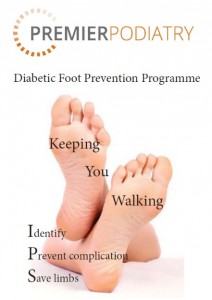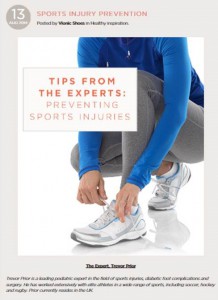- August 2024 (1)
- November 2021 (1)
- February 2021 (1)
- August 2020 (1)
- March 2020 (1)
- April 2019 (1)
- April 2018 (1)
- December 2017 (1)
- October 2017 (2)
- April 2017 (1)
- November 2015 (2)
- January 2015 (1)
- August 2014 (1)
- May 2014 (3)
- April 2014 (3)
Premier Podiatry Launch their Diabetic foot prevention programme
In recognition of World Diabetes Day (14th November 2015), Premier Podiatry launch their Diabetic foot prevention programme. With over 30 years of experience in managing the complications of diabetes in the foot and preventing amputation, Premier Podiatry have produced a brochure and launched an information page.
Top tips to complete the marathon
This is the time when we see many runners old and new heading out on the streets to begin their marathon training. London, Brighton, maybe a marathon overseas, all suggest marathon training should be under way so here’re Trevor’s top tips to help you complete the marathon:
- Make sure you have a well planned training programme building to the marathon.
- Listen to your body; if you are due a long run and simply do not feel up to it on that day, modify your training regime.
- If you start to feel a muscle tighten slow down and consider a stretch; muscle tightness is a precursor to a tear. If this does not settle, consider cutting short your session. If the problem persists, you should seek a professional opinion.
- If you develop an injury, get a professional opinion sooner rather than later. We have many patients who we have helped through the marathon.
- Make sure you have the most appropriate running shoes and they fit properly; it is very common for people to have shoes that are too short. As a rule, the shoe should be 1cm longer than your longest toe.
- Allow your shoes to dry properly after a run, this may mean having two pairs.
- Protect any areas that rub with an appropriate dressing (Compede is one type) to prevent blistering which can interrupt training.
- Consider a 3D analysis of your Running Style if:
o You have never run a marathon before and want to identify potential problems.
o You want objective advice on the best running shoe for you
o You have had a previous injury or a persistent niggle
o You want to try and optimise your performance.
For more information on gait analysis and to download our free brochure click here
If you would like more information or have a question, please contact us.
- Consider getting orthoses (specialist insoles): By using our inshoe pressure system (insoles with force sensors imbedded), we can look at the load beneath the foot and check the effect of any shoe inserts so that function can be optimised. These may be beneficial if
o You have recurrent injuries
o You have developed a problem that is affecting your training.
o You get symptoms as you fatigue towards the end of a long run.
For more information on orthoses click here
Sports injuries prevention
Trevor Prior provides some simple tips for sports injury prevention.

 Call 020 8502 1777 or
Call 020 8502 1777 or  online form
online form
